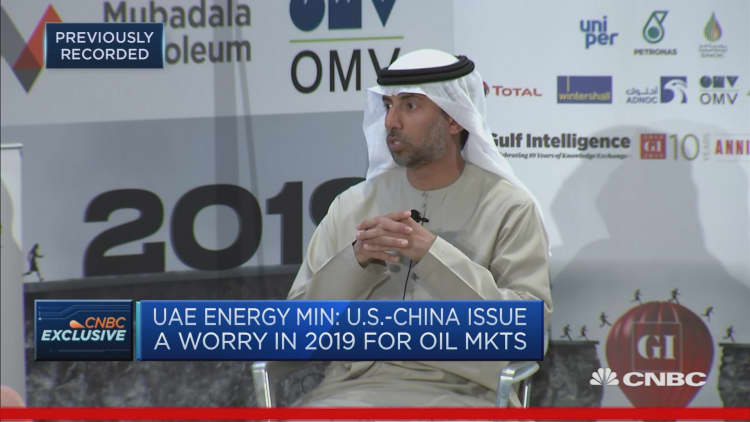KEY POINTS
- OPEC listens to what the U.S. has to say when it comes to oil prices and production but “always does the right thing,” according to the United Arab Emirates’ energy minister.
- “We’re not playing with President Trump or any other president.”
The U.S.-China trade war and booming American shale production are among the top worries for the United Arab Emirates’ energy minister and former OPEC president. After a volatile year for oil prices, hydrocarbon-exporting countries are buckling down for what could be more turbulence ahead.
In terms of geopolitical headwinds for 2019, “One is the potential of heated war between China and the United States,” Suhail Al Mazrouei told CNBC’s Hadley Gamble on Wednesday. Mazrouei finished his term at the helm of OPEC on January 1.
“We’re not playing with President Trump or any other president,” he said.
I think this is one fundamental, not only affecting us but affecting the whole economics of the world. And I tend to be… more optimistic that we are not going to see a war. It’s negotiation tactics, they will end on a resolution, whatever it takes, this year or next year. ”

While cautiously optimistic on the outcome of ongoing trade negotiations between the world’s two largest economies, Mazrouei stressed the impact of U.S. shale production on the market — something that’s increasingly putting OPEC members under pressure. “But this is one thing, how much is coming from the shale oil production I think that’s another factor we need to watch and we need to advise that it has to be reasonable,” the minister said.U.S. shale competition intensifying
Oil prices have plunged since reaching highs of more than $86 per barrel in early October over concerns of global oversupply and weakening demand. On Wednesday, benchmark Brent crude futures stood at $59.28 per barrel whereas West Texas Intermediate (WTI) futures were fetching $50.34 a barrel.
The U.S.-China trade war, political turmoil in Europe and fears of an impending slowdown in global economic growth have also seriously clouded the demand outlook.
And the Energy Information Agency has upgraded its supply growth outlook for American crude. U.S. domestic oil production is now expected to increase by 1.18 million bpd next year with output averaging 12.06 million bpd. That flood of fresh U.S. crude supply “will cement its newfound position as the world’s top oil producer,” according to consultancy firm PVM Oil Associates.No ‘political games’ with Trump
Asked about the growing criticisms of OPEC coming from the White House, Mazrouei maintained that OPEC listens to what the U.S. has to say when it comes to oil prices and production but insisted that the cartel “always does the right thing.”
“I think what we do is we hear them (the U.S.). They are major consumers versus the major producing nations, we hear what they say but we will always do the right thing from our perspective which is always trying to maintain the balance (in supply and demand).”
OPEC and its non-OPEC counterparts led by Russia agreed to a production cut of 1.2 million barrels per day in early December to put a floor under falling prices, despite Trump’s calls to keep the crude flowing. Crude prices dropped on the news that Washington would issue waivers to eight of the top importers of Iranian oil, allowing them to avoid U.S. sanctions on Iran for 180 days. OPEC members like Saudi Arabia had previously heeded Trump’s calls to increase their output to make up for what was expected to be a massive shortage in the market due to the sanctions.
“We are not in the business of trusting or not trusting presidents,” the minister said when asked if he could trust Trump. “We are in the business of watching the market and correcting it every time the geopolitics (are) a factor, affecting the market.”
Al Mazrouei’s comments follow a tumultuous 2018 for oil which was characterized by price fluctuations as OPEC and its non-OPEC allies, including Russia, vacillated between cutting and increasing their oil production in a bid to stabilize prices.
President Trump remained critical of OPEC’s strategy to restrict output, saying that prices were “too high.”
Correction: The story has been updated to reflect the correct title of UAE’s Energy Minister Suhail Al Mazrouei
This article first appeared on CNBC https://www.cnbc.com/2019/01/09/uae-oil-minister-on-president-donald-trump-and-opec.html and is republished with its permission